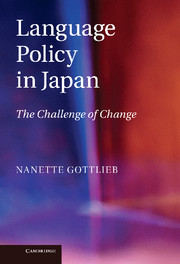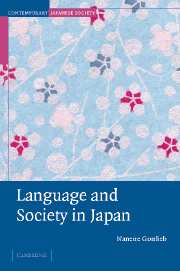37 results
Notes to the text
-
- Book:
- Language Policy in Japan
- Published online:
- 05 December 2011
- Print publication:
- 10 November 2011, pp 167-179
-
- Chapter
- Export citation
3 - Foreign languages other than English in education and the community
-
- Book:
- Language Policy in Japan
- Published online:
- 05 December 2011
- Print publication:
- 10 November 2011, pp 64-97
-
- Chapter
- Export citation

Language Policy in Japan
- The Challenge of Change
-
- Published online:
- 05 December 2011
- Print publication:
- 10 November 2011
Contents
-
- Book:
- Language Policy in Japan
- Published online:
- 05 December 2011
- Print publication:
- 10 November 2011, pp vii-viii
-
- Chapter
- Export citation
Frontmatter
-
- Book:
- Language Policy in Japan
- Published online:
- 05 December 2011
- Print publication:
- 10 November 2011, pp i-v
-
- Chapter
- Export citation
References
-
- Book:
- Language Policy in Japan
- Published online:
- 05 December 2011
- Print publication:
- 10 November 2011, pp 180-204
-
- Chapter
- Export citation
2 - The language needs of immigrants
-
- Book:
- Language Policy in Japan
- Published online:
- 05 December 2011
- Print publication:
- 10 November 2011, pp 33-63
-
- Chapter
- Export citation
Index
-
- Book:
- Language Policy in Japan
- Published online:
- 05 December 2011
- Print publication:
- 10 November 2011, pp 205-207
-
- Chapter
- Export citation
5 - National language policy and an internationalising community
-
- Book:
- Language Policy in Japan
- Published online:
- 05 December 2011
- Print publication:
- 10 November 2011, pp 123-160
-
- Chapter
- Export citation
Acknowledgments
-
- Book:
- Language Policy in Japan
- Published online:
- 05 December 2011
- Print publication:
- 10 November 2011, pp xiv-xiv
-
- Chapter
- Export citation
Conclusion
-
- Book:
- Language Policy in Japan
- Published online:
- 05 December 2011
- Print publication:
- 10 November 2011, pp 161-166
-
- Chapter
- Export citation
1 - Language ideology, planning and policy
-
- Book:
- Language Policy in Japan
- Published online:
- 05 December 2011
- Print publication:
- 10 November 2011, pp 1-32
-
- Chapter
- Export citation
4 - Technology and language policy change
-
- Book:
- Language Policy in Japan
- Published online:
- 05 December 2011
- Print publication:
- 10 November 2011, pp 98-122
-
- Chapter
- Export citation
Preface
-
- Book:
- Language Policy in Japan
- Published online:
- 05 December 2011
- Print publication:
- 10 November 2011, pp ix-xiii
-
- Chapter
- Export citation
The Rōmaji movement in Japan
-
- Journal:
- Journal of the Royal Asiatic Society / Volume 20 / Issue 1 / January 2010
- Published online by Cambridge University Press:
- 30 November 2009, pp. 75-88
- Print publication:
- January 2010
-
- Article
- Export citation
6 - Representation and identity: discriminatory language
-
- Book:
- Language and Society in Japan
- Published online:
- 14 November 2009
- Print publication:
- 03 February 2005, pp 100-119
-
- Chapter
- Export citation
7 - Shifting electronic identities
-
- Book:
- Language and Society in Japan
- Published online:
- 14 November 2009
- Print publication:
- 03 February 2005, pp 120-136
-
- Chapter
- Export citation

Language and Society in Japan
-
- Published online:
- 14 November 2009
- Print publication:
- 03 February 2005
1 - The Japanese language
-
- Book:
- Language and Society in Japan
- Published online:
- 14 November 2009
- Print publication:
- 03 February 2005, pp 1-17
-
- Chapter
- Export citation
List of figures
-
- Book:
- Language and Society in Japan
- Published online:
- 14 November 2009
- Print publication:
- 03 February 2005, pp vi-vi
-
- Chapter
- Export citation

